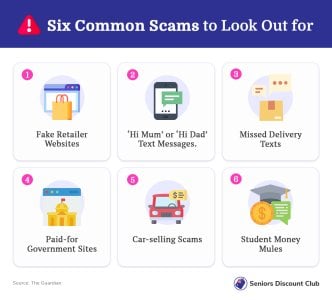Six sneaky scams and how to outsmart them!
By
Seia Ibanez
- Replies 3
Fake websites, suspicious texts and unknown caller phone calls – each week brings yet more evidence that scams remain a real and present danger. That’s why being aware of possible scams is important.
Here are some of the most common scams to be on the lookout for and some useful tips to avoid them:
1. Fake Retailer Websites
These days, you never have to wait too long for criminals to take advantage of a news story. For instance, customers placed their orders from a fake Domino’s website carefully designed to mimic the real one, and victims lost around $800.
Although these sites can look similar to official websites, don’t be fooled. Double-check when things look a bit suspicious, and be cautious of websites that pressure you to quickly complete your purchase.
If an offer looks too good to be true, then it probably is.
2. ‘Hi Mum’ or ‘Hi Dad’ Text Messages
Be wary of any text messages from a supposed relative claiming to have lost their phone and requesting money. Unless you have actually verified and have spoken to the relative in question, don’t make the payment, no matter how much pressure is put on you.

3. Missed Delivery Texts
Similar to the 'Hi Mum' scam, you may get a text or email claiming to be from a courier attempting to deliver a parcel and asking for a fee to be paid. Be very aware of the link address or URL of the website or app you’re downloading. If it looks suspicious and misleading, it’s likely a scam.
Also, if you’re not expecting a parcel, it’s best just to ignore the message.
4. Paid Government Sites
Government sites will never charge you a fee to log in. If you need to update your driver’s licence details, for example, beware of the sponsored listings that often pop up at the top of your web search – they may look official, but in reality, they’re just charging you an extra fee for something that’s actually free.
5. Car-selling Scams
Ads posted on online marketplaces for car-selling scams continue to be a problem. Scammers will rush you into transferring a deposit or full payment for something you’ve never seen – and then disappear with your money.
Never pay for a car until you have at least seen it in real life.
6. Student Money Mules
We know this one might not be relevant to many of you but there are some mature students who are a part of the SDC. You may also like to warn your kids and grandkids to be careful of this particular scam.
As more universities are going digital, online fraudsters have been targeting students with requests to become ‘money mules’, using their bank details to launder funds. Don’t be fooled by promises of gifts or cash! Be wary of people reaching out to you online with requests to move money into a new account.

Remember, if something sounds too good to be true, it probably is. If you're unsure, contact your bank to verify a transaction or do your own research before making a payment. And, as always, keep your personal information safe.
Are there other scams that members need to be aware of? Share them in the comments below!
Here are some of the most common scams to be on the lookout for and some useful tips to avoid them:
1. Fake Retailer Websites
These days, you never have to wait too long for criminals to take advantage of a news story. For instance, customers placed their orders from a fake Domino’s website carefully designed to mimic the real one, and victims lost around $800.
Although these sites can look similar to official websites, don’t be fooled. Double-check when things look a bit suspicious, and be cautious of websites that pressure you to quickly complete your purchase.
If an offer looks too good to be true, then it probably is.
2. ‘Hi Mum’ or ‘Hi Dad’ Text Messages
Be wary of any text messages from a supposed relative claiming to have lost their phone and requesting money. Unless you have actually verified and have spoken to the relative in question, don’t make the payment, no matter how much pressure is put on you.

Some text messages come from a supposed relative, claiming to have lost their phone and requesting money. Credit: Unsplash
3. Missed Delivery Texts
Similar to the 'Hi Mum' scam, you may get a text or email claiming to be from a courier attempting to deliver a parcel and asking for a fee to be paid. Be very aware of the link address or URL of the website or app you’re downloading. If it looks suspicious and misleading, it’s likely a scam.
Also, if you’re not expecting a parcel, it’s best just to ignore the message.
4. Paid Government Sites
Government sites will never charge you a fee to log in. If you need to update your driver’s licence details, for example, beware of the sponsored listings that often pop up at the top of your web search – they may look official, but in reality, they’re just charging you an extra fee for something that’s actually free.
5. Car-selling Scams
Ads posted on online marketplaces for car-selling scams continue to be a problem. Scammers will rush you into transferring a deposit or full payment for something you’ve never seen – and then disappear with your money.
Never pay for a car until you have at least seen it in real life.
6. Student Money Mules
We know this one might not be relevant to many of you but there are some mature students who are a part of the SDC. You may also like to warn your kids and grandkids to be careful of this particular scam.
As more universities are going digital, online fraudsters have been targeting students with requests to become ‘money mules’, using their bank details to launder funds. Don’t be fooled by promises of gifts or cash! Be wary of people reaching out to you online with requests to move money into a new account.
Key Takeaways
- Fraudsters exploit news stories to create fake retailer websites, which have caused over 5,000 complaints from Santander customers in August.
- A common scam, known as the 'Hi mum' or 'Hi Dad' text message, pretends to be from a relative needing help to pay for something and asks for money to be transferred.
- Scammers also send texts or emails pretending to be from a courier service needing payment or rearrangement of delivery.
Are there other scams that members need to be aware of? Share them in the comments below!
Last edited:








